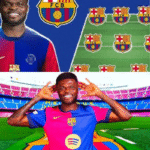Arsenal’s Thomas Partey Contract Negotiations: A Comprehensive Analysis of His Future Amid Barcelona Interest

The football world’s attention has turned to North London as Arsenal Football Club finds itself at a crucial juncture regarding one of their most influential players. Thomas Partey, the Ghanaian international midfielder who has become synonymous with Arsenal’s recent resurgence, stands at the center of ongoing contract negotiations that could define both his career trajectory and the club’s ambitions for the upcoming seasons.
Arsenal have officially confirmed that discussions are actively underway with Thomas Partey regarding a potential contract extension, a development that comes at a critical time as the 31-year-old midfielder’s current agreement is set to expire on June 30, 2025. This confirmation from the club represents more than just routine administrative business; it signals Arsenal’s strategic intent to retain one of their most valuable assets while navigating the complex landscape of modern football transfers.
The timing of these negotiations is particularly significant, occurring against the backdrop of persistent speculation linking Partey with a high-profile move to Barcelona. The Spanish giants, known for their ability to attract world-class talent, have reportedly shown interest in the Ghanaian international, adding an element of urgency to Arsenal’s contract discussions. This situation exemplifies the delicate balance that modern football clubs must maintain between financial prudence and competitive necessity.
Arsenal’s approach to these negotiations reflects a broader strategy of squad stability and continuity. The club’s statement acknowledging that “discussions are ongoing, and once matters are finalized between all parties, we will communicate in due course” demonstrates a measured approach to what is undoubtedly a complex negotiation involving multiple stakeholders, including the player, his representatives, and the club’s hierarchy.
To understand the significance of these contract talks, one must examine Thomas Partey’s profound impact on Arsenal’s recent performances and tactical evolution. Since his arrival from Atlético Madrid in October 2020, Partey has gradually established himself as one of the Premier League’s most influential midfielders, despite facing various challenges including injuries and adaptation periods.
The 2024-25 season has been particularly revealing regarding Partey’s importance to Mikel Arteta’s tactical system. Making 52 appearances across all competitions—his highest tally since joining Arsenal—Partey has demonstrated remarkable consistency and durability that had previously been questioned due to injury concerns. This increased availability has coincided with Arsenal’s improved performances in both domestic and European competitions, suggesting a direct correlation between Partey’s presence and the team’s success.
His statistical contribution of four goals and three assists might appear modest at first glance, but these numbers fail to capture the full extent of his influence on Arsenal’s play. Partey’s role extends far beyond traditional offensive metrics; he serves as the fulcrum around which Arsenal’s possession-based system revolves. His ability to dictate tempo, break up opposition attacks, and initiate counter-pressing sequences has become fundamental to how Arsenal approach matches across different competitions.
The Ghanaian international’s versatility has also proven invaluable to Arteta’s tactical flexibility. Throughout the season, Partey has seamlessly transitioned between different midfield roles, occasionally dropping into defensive positions when required, and pushing forward to support attacking phases when the tactical situation demands it. This adaptability has allowed Arsenal to maintain tactical coherence even when facing various injury challenges throughout their squad.
The emergence of Barcelona as potential suitors for Partey adds a compelling dimension to the contract negotiations. Barcelona’s interest is not merely speculative; it reflects their recognition of Partey’s unique skill set and his potential fit within their tactical framework. The Catalan club’s midfield has undergone significant transitions in recent years, and Partey’s profile as an experienced, physically robust, and technically proficient midfielder aligns with their evolving needs.
From Barcelona’s perspective, Partey represents an opportunity to acquire a proven performer who can contribute immediately while potentially being available on favorable terms due to his contract situation. The financial dynamics of modern football often create scenarios where players in the final year of their contracts become attractive propositions for clubs seeking to maximize their transfer budget efficiency.
However, the potential move to Barcelona is not without complications. The Spanish club’s well-documented financial challenges in recent years mean that any significant transfer activity must be carefully planned and executed within strict budgetary constraints. Additionally, Partey’s age profile, while bringing experience and maturity, might conflict with Barcelona’s strategic emphasis on developing younger talents for long-term success.
For Partey himself, the Barcelona opportunity represents a chance to experience a different footballing culture and potentially compete for different types of honors. The allure of playing for one of football’s most storied institutions, with their rich history in both domestic and European competitions, cannot be understated in terms of career ambitions and legacy considerations.
Mikel Arteta’s tactical evolution at Arsenal has been marked by several phases, with Partey’s integration representing a crucial element in the team’s development toward a more sophisticated and sustainable playing style. When Arteta initially took charge of Arsenal, the team often relied on individual brilliance and counter-attacking sequences to achieve results. However, the gradual implementation of a more possession-based, positionally sophisticated system has coincided with Partey’s increasing influence within the squad.
The Ghanaian midfielder’s ability to operate effectively in different phases of play has enabled Arteta to implement tactical variations that were previously difficult to execute consistently. In defensive phases, Partey’s positioning and reading of the game allow Arsenal to maintain compact defensive structures while remaining prepared for quick transitions. His physical presence and aerial ability provide additional security during set-piece situations, both defensively and offensively.
During possession phases, Partey’s technical skills and vision become particularly apparent. His range of passing, from short, intricate combinations to longer, defense-splitting passes, provides Arsenal with multiple options for progressing the ball through different areas of the pitch. This versatility has proven especially valuable when facing opponents who employ different pressing strategies or defensive formations.
The transition phases of the game represent perhaps the most crucial area where Partey’s influence is felt. His ability to win back possession quickly and immediately initiate attacking sequences has become a trademark of Arsenal’s improved performances. This quick transition capability has allowed Arsenal to exploit opponents who commit players forward, creating numerical advantages in attacking situations.
Arsenal’s confirmation of contract talks with Partey occurs within the context of broader squad restructuring efforts that reflect the club’s strategic planning for future seasons. The departure of several senior players, including Raheem Sterling, Kieran Tierney, Neto, and Jorginho, indicates a deliberate approach to squad composition that balances experience with emerging talent and financial sustainability.
This restructuring process involves multiple considerations beyond simple player performance metrics. Age profiles, contract lengths, wage structures, and tactical fit all play crucial roles in determining which players remain part of Arsenal’s long-term plans. Partey’s situation encapsulates many of these considerations, as his experience and current performance level must be weighed against his age and the potential financial commitment required for a contract extension.
The club’s approach to retaining key players while making room for new signings reflects modern football’s complex ecosystem where sporting success must be achieved within financial constraints. UEFA’s Financial Fair Play regulations and the Premier League’s Profit and Sustainability Rules create additional layers of complexity that influence how clubs approach contract negotiations and transfer activities.
Arsenal’s strategic planning also involves consideration of the club’s competitive ambitions across multiple fronts. With both Premier League title aspirations and UEFA Champions League campaigns requiring squad depth and quality, the retention of experienced players like Partey becomes crucial for maintaining competitive standards across different competitions simultaneously.
The financial aspects of Partey’s contract situation extend beyond simple salary negotiations to encompass broader implications for Arsenal’s financial planning and competitive positioning. As a player with significant market value and proven Premier League experience, Partey’s contract terms will likely reflect his status as one of Arsenal’s key assets.
Contract negotiations in modern football involve complex structures that include base salaries, performance-related bonuses, image rights, and various other commercial considerations. For a player of Partey’s profile, these negotiations must balance the player’s market value against the club’s wage structure and financial capabilities.
The potential loss of Partey on a free transfer would represent a significant financial blow to Arsenal, both in terms of the immediate loss of a valuable asset and the subsequent cost of replacing his contribution to the squad. This financial dimension adds urgency to the contract negotiations and may influence the terms that Arsenal are willing to offer.
From Partey’s perspective, the contract negotiations represent an opportunity to secure his financial future while considering the various factors that influence career decisions at this stage of his professional journey. The balance between financial security, competitive ambitions, and personal preferences creates a complex decision-making environment.
Partey’s potential departure or retention will have significant implications for Arsenal’s dressing room dynamics and overall team chemistry. As one of the more experienced players in the squad, Partey has gradually assumed leadership responsibilities that extend beyond his on-field contributions.
His relationship with younger players in the squad has been particularly notable, with several emerging talents benefiting from his guidance and experience. The continuity provided by retaining experienced players like Partey can be crucial for maintaining the positive momentum that Arsenal have built in recent seasons.
The uncertainty surrounding his future, however, can also create potential disruptions if not managed carefully. Transfer speculation and contract negotiations can become distractions that affect both individual and collective performance levels. Arsenal’s management team must navigate these challenges while maintaining focus on their competitive objectives.
Partey’s situation at Arsenal also carries significance from the perspective of Ghanaian football and his international career ambitions. As one of Ghana’s most prominent players competing at the highest level of European football, his club situation directly impacts his ability to maintain the form and fitness required for international duties.
Ghana’s national team has relied heavily on Partey’s contributions in recent years, particularly during major tournament campaigns and qualifying series. His continued presence at a club like Arsenal, competing regularly in high-level competitions, is crucial for maintaining his international performance standards.
The potential move to Barcelona, while representing a significant opportunity, would also need to be evaluated in terms of playing time guarantees and the role he would be expected to fulfill. Regular playing time at club level remains essential for maintaining his position as a key player for Ghana’s national team.
As Arsenal’s contract negotiations with Thomas Partey continue, several scenarios emerge that could shape both the player’s future and the club’s strategic direction. Each potential outcome carries distinct implications for all parties involved.
Should Arsenal successfully secure Partey’s signature on a new contract, it would represent a significant statement of intent regarding their competitive ambitions. Retaining a player of his caliber and experience would provide tactical continuity for Arteta while maintaining squad stability during a period of broader changes.
The alternative scenario, where Partey departs either to Barcelona or another destination, would necessitate significant adjustments to Arsenal’s squad planning and tactical approach. Replacing his specific skill set and experience would require careful consideration of available options in the transfer market, potentially involving substantial financial investment.
A third possibility involves a shorter-term contract extension that provides both parties with flexibility while addressing immediate needs. This approach could allow Arsenal to retain Partey’s services for another season or two while providing the player with options for his later career stages.
The ongoing contract negotiations between Arsenal and Thomas Partey represent more than a simple contractual matter; they encapsulate the complex dynamics of modern football where sporting ambitions, financial constraints, and individual career objectives must be carefully balanced.
For Arsenal, retaining Partey represents an opportunity to maintain momentum in their pursuit of major honors while preserving the tactical foundation that has underpinned their recent success. The club’s approach to these negotiations will signal their commitment to competing at the highest level and their ability to retain key players amid external interest
For Partey, the decision involves weighing the security and familiarity of remaining at Arsenal against the potential excitement and challenges of a new environment. The Barcelona interest adds an additional dimension that could influence his thinking, but the ultimate decision will likely depend on multiple factors including playing time guarantees, competitive prospects, and personal preferences.
The resolution of this situation will provide valuable insights into how Arsenal navigate the challenges of squad management in the modern era, while also demonstrating the club’s ability to compete with Europe’s elite institutions for top-level talent. Regardless of the outcome, the negotiations themselves highlight the complex ecosystem of contemporary football where every decision carries implications that extend far beyond the immediate parties involved.
As these discussions continue, all stakeholders will be hoping for a resolution that serves their respective interests while maintaining the positive trajectory that has characterized Arsenal’s recent development under Mikel Arteta’s guidance. The coming weeks will likely prove crucial in determining not only Partey’s immediate future but also Arsenal’s strategic direction as they prepare for the challenges and opportunities that lie ahead in their pursuit of domestic and European success.















